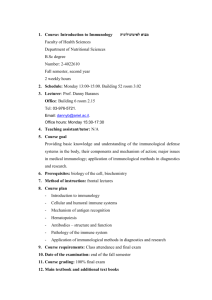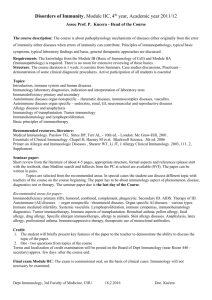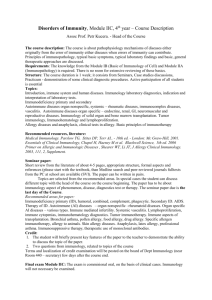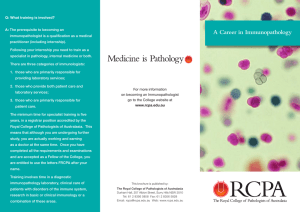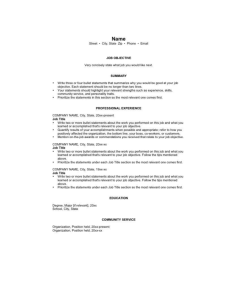The body fights back
advertisement
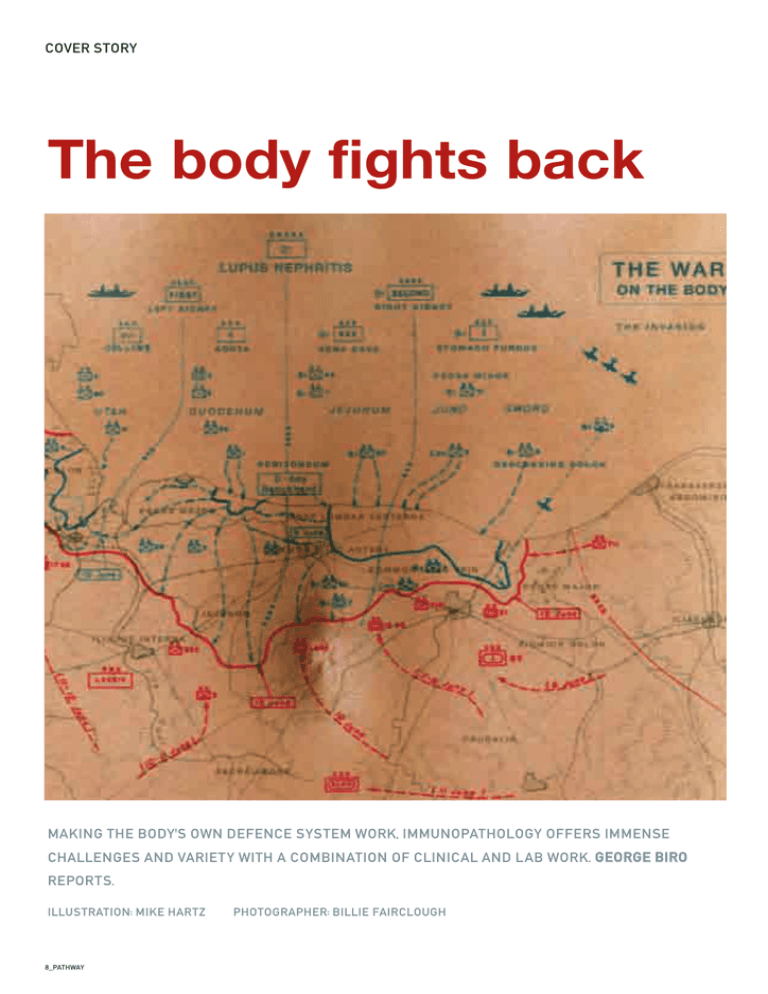
COVER STORY The body fights back MAKING THE BODY'S OWN DEFENCE SYSTEM WORK, IMMUNOPATHOLOGY OFFERS IMMENSE CHALLENGES AND VARIETY WITH A COMBINATION OF CLINICAL AND LAB WORK. GEORGE BIRO REPORTS. ILLUSTRATION: MIKE HARTZ 8_PATHWAY PHOTOGRAPHER: BILLIE FAIRCLOUGH Advances in immunological tests and treatments have greatly improved life expectancy. r Tiffany Hughes grew up on a sheep station in South Australia and had her schooling by correspondence and the School of the Air. In 1993, she graduated in medicine from Adelaide University. D To become an immunopathologist, she went on to gain dual fellowships of the colleges of pathologists and physicians. The training was long but she enjoyed working in various places in Australia and overseas. Basic physician training takes at least three years, and is followed by another four years in immunopathology and clinical immunology. The aim is to integrate clinical and laboratory work, to follow patients and their investigations from bedside to bench top. As well as learning on the job, candidates for the pathology exams can attend local and national teaching programs and workshops. Dr Hughes now works part-time at two hospitals: Western Australia’s Fremantle Hospital and Princess Margaret Hospital. The former has children and adults, the latter only children. She finds this gives her a stimulating mix of patients, clinical and laboratory work, teaching and research, while leaving her some personal time. She works six sessions a week and she and her husband are expecting their first child. Pregnancy is an area where immunopathology can very much come into play. Many complications (recurrent miscarriage, stillbirth and prematurity) have an autoimmune basis, wherein the immune system mistakenly targets a person’s own body. Most often the problem is SLE (systemic lupus erythematosus), which can cause inflammation, pain and tissue damage. One young woman had a miscarriage, then a couple of weeks later, a stroke. Testing showed she had lupus as well as an autoimmune disorder that leads to blood clots. With treatment, she has recovered from her stroke, her lupus is in remission and she is considering another pregnancy. Some people, often children, have deficient immune systems. Immunodeficiency suggests a lack, or a malfunction, of immune cells (white blood cells). Sometimes the deficiency is mild and resolves as children grow. But others may suffer catastrophic infections from common agents such as the glandular fever virus or fungi and may develop leukaemia or other malignancies. Laboratory tests assess the number and function of the white blood cells and other immunological defences, such as antibodies. Some children need replacement of missing antibodies, some need a bone marrow transplant, and others need supportive care (for example, antibiotics and careful monitoring). Advances in immunological tests and treatments have greatly improved life expectancy. Dr Hughes sees a man aged 20 who has chronic granulomatous disease, a genetic disease that mostly affects boys and leads to profound bacterial and fungal infections. Since infancy he has suffered fungal pneumonia and osteomyelitis (bone infection). The disease has also slowed his growth and put enormous pressure on his family. In the past, it killed most children in the first decade of life. But now this man is well most of the time. Allergies result from the interplay of genetics and the environment; Louis Pasteur talked about “the seed and the soil”. Dr Hughes says food allergies are common in children and becoming even more so. Some, such as an allergy to nuts, are serious or even life threatening. Promising research in Western Australia may help to prevent allergies among children born to mothers with the problem. Expectant mothers are naturally cautious about taking drugs, but a probiotic such as proTract is safe. It changes the bacteria in the bowel, encourages “good bacteria” and may reduce the risk of allergy in the child. The fairly new field of immunogenetics includes the testing of potential recipients of transplants to avoid rejection. There are also now tests for susceptibility to conditions such as coeliac disease (a gluten intolerance) and HIV/AIDS. Dr Dominic Mallon enjoys a varied and challenging workload. As an immunopathologist, he sees and treats children and adults. As well, he works in three laboratories that offer tests to diagnose immune disorders. He also collaborates with immunologists in basic and clinical research. Dr Mallon graduated as a doctor from WA University in 1986 and finished basic training in internal medicine in 1992. Because of his interest in HIV medicine, he entered advanced training as a senior registrar in immunology and immunopathology at Royal Perth and Sir Charles Gairdner hospitals in Perth. This involved working full-time while training in laboratory diagnosis and clinical management of immunological disorders. Four years of this advanced training earned him fellowships of the Australasian colleges of pathologists and physicians. Dr Mallon is convinced his clinical background makes him a better pathologist and vice versa. Since 1997, he has held a joint appointment as head of department, South Metropolitan Area Clinical Immunology and Allergy Services and clinical immunologist at the Princess Margaret Hospital for Children. Patient Power! Associate Professor Elizabeth Benson, director of immunopathology at the Institute of Clinical Pathology and Medical Research at Westmead in Sydney, tells of an 82-year-old patient who was playing bridge when she had a sudden loss of vision, later diagnosed as temporal arteritis. Vigorous treatment with steroids and heparin led to her vision returning; that is unusual enough. But some months later, she was playing again with the same partner, when this partner became ill. Then and there, at the card table, the 82-year-old diagnosed her partner’s temporal arteritis. Next she got the patient posthaste to hospital, where the diagnosis was confirmed by biopsy, the patient was treated and also recovered completely. PATHWAY_9 “I find immunopathology exciting,’’ Dr Mallon says. ‘‘It combines basic immunology with a better understanding of new and older tests that helps us make more accurate diagnoses and offer more rational treatments.” He relates the cases of two girls aged about 12. The first had swollen ankles, and doctors diagnosed nephrotic syndrome (a kidney problem of unknown cause). She had an abnormally high level of antinuclear antibodies, which made Dr Mallon suspect an autoimmune disease. A kidney biopsy confirmed this; she had lupus nephritis. Her kidney function returned to normal and she remained well after treatment with immunosuppressant drugs. “Forty or 50 years ago, she would have either died, or would have had kidney failure requiring regular dialysis for the rest of her life,” Dr Mallon says. The other girl first saw a haematologist, complaining of being very tired. She had severe anaemia and had been on a school camp in a cold part of WA. Like the first girl, she also had a high level of antinuclear antibodies, but her antibodies were directed against her red blood cells. Dr Mallon diagnosed lupus. Her abnormal antibodies, combined with the cold weather at the camp, had broken down many of her red blood cells, causing anaemia. She still needs small doses of drugs to keep her antibodies in check, but is doing well. man with a sore red eye. Because he had a positive ANCA test (anti-neutrophil cytoplasmic antibody), I rang the eye doctor who referred the man to see me. “I find immunopathology exciting,’’ Dr Mallon says. ‘‘It combines basic immunology with a better understanding of new and older tests that helps us make more accurate diagnoses and offer more rational treatments.” “I confirmed our suspicion of Wegener’s granulomatosis. This is a potentially fatal autoimmune disease that classically affects the nose, lungs and kidneys and sometimes the eyes, joints and skin. Since we started him on longterm steroids and the immunosuppressive drug azathioprine he has done well. We can’t cure him, but we do hope to control his disease.” The airlines must love Dr Marianne Empson. After graduating in medicine in Auckland in 1987, she started working at Sydney’s Prince Alfred Hospital while completing her dual training as an immunopathologist and physician immunologist. She talked to me while on a flying weekend visit to Sydney as an examiner. Dr Empson has appointments at Auckland Hospital, Auckland University and Diagnostic Medlab. “I enjoy the variety of my work, which no single job could offer,’’ she says. ‘‘Not long ago, an eye doctor sent our lab a blood sample from a She says immune deficiencies may be picked up in the laboratory when patients have low immunoglobulins, proteins that help destroy foreign substances. Most of these patients have common variable immune deficiency and need lifelong intravenous immunoglobulin infusions. “In the long term, biological therapy (injected antibodies) will probably revolutionise treatment of patients with autoimmune diseases. Antibodies are widely used in rheumatoid arthritis, other autoimmune diseases, cancer therapy and allergic disease. This is an exciting area of research and development.” Dr Stephen Adelstein graduated from South Africa’s University of Witwatersrand in 1977. As a student he wrote an essay on the Nobel Prize-winning work of Sir Macfarlane Burnet on immunological tolerance. This inspired him to become an immunopathologist after migrating to Australia. After a decade or so of further study and “apprenticeship”, Dr Adelstein had a PhD and fellowships of two colleges: pathologists and physicians. Among his many hats, he is now head of immunopathology at Royal Prince Alfred Hospital and chief examiner in immunopathology for the Royal College of Pathologists of Australasia. Dr Tiffany Hughes, immunopathologist Fremantle and Princess Margaret Hospitals 10_PATHWAY “This is the type of job I always wanted. Every day is different: I enjoy contacts with patients, staff and students,” he says. “New laboratory tools help diagnose patients with puzzling symptoms. For instance, we all have an antigen tissue transglutaminase, which usually causes no problem. But people Dr Dominic Mallon, head of department, South Metropolitan Area Clinical Immunology and Allergy Services and clinical immunologist at the Princess Margaret Hospital for Children with coeliac disease produce antibodies to that antigen. Now that we can measure the levels of such abnormal auto-antibodies, we are finding that coeliac disease can present with very varied symptoms.” Dr Adelstein also describes great advances in diagnosing and treating immune deficiencies such as HIV/AIDS. “A decade or two ago, these patients usually went downhill and died quickly. Now, measuring viral load helps us not only to predict prognosis but also decide on the best treatment. “With newer drugs like the protease inhibitors, we hope to turn HIV into a chronic but manageable disease, like diabetes. Similarly, newer tests for rheumatoid arthritis … can detect the disease earlier and more specifically. Newer drugs target specific receptors and help to keep patients active and mobile.” Dr Adelstein says immunology is one of the few fields where clinical and laboratory skills combine seamlessly. “While automation in laboratories means machines can do more tests on more samples, we will always need skilled people to interpret abnormal or unexpected results,” he says. DR KARL BAUMGART striking thing about Dr Karl Baumgart, even on the phone, is his positive attitude to life and his varied work. His motto is CAN DO, WILL DO, DO DO! A Dr Baumgart switches easily from seeing patients to working in the large, busy private pathology lab of Douglass Hanly Moir. He sees himself as a generalist. His lab work is largely in immunopathology and allergy, but overlaps with genetics, serology (the study of blood) and biochemistry. In the lab, Dr Baumgart fields up to 25 calls from family doctors and 15 from specialists: “It’s a bit like being an Australian batsman facing all the English bowlers!” Some of the calls are from rural and remote areas. Country patients seldom get to Sydney, but their pathology samples often do. He enjoys working with their doctors to ensure that they get the right tests that lead to accurate diagnoses. He finds immunology an exciting, still evolving specialty. For example, some families have a genetic disorder (Factor V Leiden mutation) that increases their risk of blood clots that may block their arteries. Dr Baumgart has helped to develop tests for this. Coeliac disease is another inherited disorder; it affects 1-2 per 1000 people. Because of an abnormality of their immune system triggered by foods containing a protein (gliadin) found in wheat and rye, children with the problem do not absorb food normally and hence do not gain weight normally. The standard test for the disease has been to take a small tissue sample from the small bowel. Another diagnostic method has been a blood test. But Dr Baumgart has helped develop a test based simply on a mouth swab. With allergies becoming more common (or at least more prominent), he would like government funding to enable family doctors to test patients. As president of the Australasian Society of Clinical Immunology and Allergy, he is busy planning a scientific meeting of the society to be held in Sydney next year. PATHWAY_11
